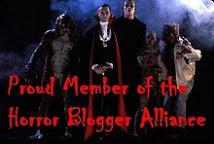(2006, Dir. by J.T. Petty.)
I didn't know what I was doing when I started watching S&Man (or, Sandman, if you prefer letters). I'd heard about it through some other horror fans, and I knew it was one of those indie horror films that had drawn the attention of many. So when I saw that it was available to watch, I just blindly threw myself at it.
My decision is a lot like the one made by filmmaker JT Petty, who is behind the camera throughout the faux-documentary film. Wanting to make a documentary about voyeurism, and losing his chance to talk to a real life voyeur, Petty turns to the next best thing - horror filmmakers. He's not just going for everyday horror filmmakers, he's going for the people who make the goriest, trashiest, most insanely DIY horror films out there.
Petty's journey brings him across people like filmmakers Bill Zebub and Fred Vogel and scream queen Debbie D, the people who are involved in some productions that most people would find terribly sickening. If you haven't heard of them or any of their films - whose titles range from Dead Ink to Maskhead to Forgive Me For Raping You - you're not alone; I'd never heard of any of them either. Rest assured though, these are real people who make real trash, and are quite proud of what they do. Petty also meets scholars, like author Carol J. Clover (who I had actually heard of due to her book Men, Women, and Chainsaws: Gender in the Modern Horror Film). Each of these people, academic or not, have a statement to make about society's voyeuristic lust for murder, but they don't quite have what Petty was looking for.
Enter Eric Rost. Eric is a seemingly normal fellow who is also behind a series called S&Man. Unlike the works of the other filmmakers Petty meets, these films aren't about gore or nudity. (If that sounds like I'm demeaning those films, know that Mr. Zebub comments at one point that "you will jerk off during one of my movies"). Rost's films are truly voyeuristic; choosing a victim, following them, entering their life unannounced, and seemingly erasing their identity. When all hope seems to have been lost, Rost does the last thing his film needs - he kills them. His approach makes his films appear similar to snuff films - the long fabled pornographic genre in which directors actually kill their victims - but surely Rost isn't that mad. Right?
I must say, first and foremost, that S&Man was an endurance test for me as a someone who is primarily a mainstream horror viewer. (I'm from Iowa, cut me some slack. We don't have enough sickos.) One one hand, there's the films of Zebub and Vogel that are featured throughout the film, which are designed to be repulsive and/or exploitative. On the other, there are Rost's films. These episodes of his S&Man series seem innocent enough at first, because they're not in your face about killing, they don't come complete with special effects and nudity. And yet, as we continue to see them, they become a little scarier by the minute...because they continue to turn more realistic.
As the film crescendos, Rost becomes one of the most disturbing characters on film in some time. What seems like honest social ineptitude at the beginning of the film slowly dissolves, and what's left is an unsettling fellow who we just can't feel comfortable with. Petty and his filmmaking companions also begin to have doubts, and it's then when S&Man - which had already grossed me out with the footage from the other filmmakers - really gets under the skin.
It's hard to feel comfortable recommending a film like S&Man, because it seems to speak against many of the escapist qualities I love in my horror. That said, the documentary presentation does wonders for Petty and his film by really making the viewer think about what they want out of horror and at what point our lust for fear and blood becomes a voyeuristic trait. That ability to provoke thought, mixed with the unique character that is Eric Rost, makes for a fine achievement. If you think you want to gaze into the proverbial abyss, this movie might just get you there. In the meantime, beware of what's gazing back at you.
Lessons Learned: 2025!
13 hours ago














































